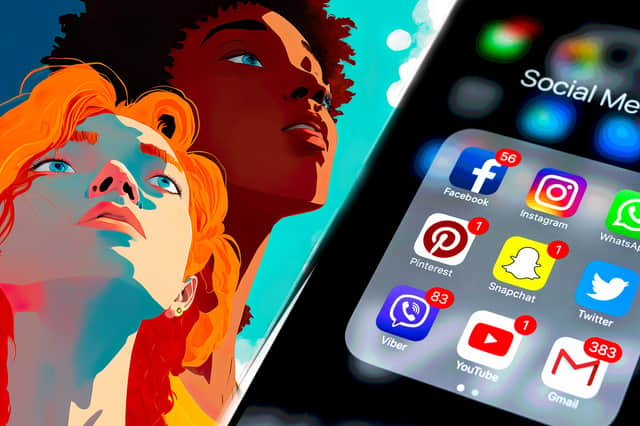Gen Z blames social media for political differences between men and women
This article contains affiliate links. We may earn a small commission on items purchased through this article, but that does not affect our editorial judgement.
and live on Freeview channel 276
Gen Z believes that social media is driving the divergent political and ideological beliefs between men and women.
While females are becoming significantly more progressive and left wing, young males are getting more conservative. This divergence in beliefs is very unusual. Previous generations tend to have the same ideological views, be it millennials or baby boomers.
Advertisement
Hide AdAdvertisement
Hide AdA study from the Economist found that education and a more “feminised” culture caused female voters aged 18 to 29 to identify as liberal, whilst male resentment pushed them to conservative views. While two decades ago there was little difference between men and women in this age range when asked to place themselves on a scale of one to ten signifying “very liberal” to “very conservative”.
The magazine’s analysis of 20 wealthy countries discovered that by 2020 the gap had grown to 0.75 on the scale. In Britain, the gap between men and women was 0.71.
This is having significant societal impacts in countries like South Korea, which now has the lowest birth rate in the world. Korean women say they are put off relationships with men due to their traditional views, who expect them to quit work and look after the children. South Korea’s population is due to halve by 2100 if the current trends continue.
But what does Gen Z think, are they noticing a political division within their own relationships?
Advertisement
Hide AdAdvertisement
Hide Ad

‘Women’s freedom can be intimidating for guys’
Hannah Telford, 21, from Newcastle, told NationalWorld she thought the freedom women now have is intimidating for some men. “I have seen some changes in the workplace even between me and the younger colleagues. I feel like we are on different pages entirely,” she said.
“I remember when I was at university it was worse as there would be some extremities on both sides, this certainly caused arguments when I was living with eight people.
“The role of women has changed so much for our generation, for women we have much more freedom, I think that can be intimidating for some guys.”
Lucy Hainsworth, 20, a student in Sheffield, agreed: “Men are beginning to feel more competitive with girls, if I ever bring up women’s achievements there will always be someone chiming in to compare it with a man in power for example.
Advertisement
Hide AdAdvertisement
Hide Ad“Girls my age are beginning to embrace hyper-sexuality and being quite free, traditional things like girlfriends have been replaced by situationships and such things.”
‘Women’s success is triggering men’
Whilst some choose to avoid political discussion, members of Gen Z are very much aware that social media stands out as a primary driving force for splitting young adults' opinions. Due to its power, social media can become dangerous and online echo chambers can heavily influence young minds.
Dr Alice Evans, a senior lecturer in the social science of development at King’s College London, said the significant change in young politics was driven by several social factors. They included a more feminised public culture, resentment, and agreed with Gen Z’s opinion of social media bubbles.
Dr Evans is currently writing her book The Great Gender Divergence. “Rising university enrolment has motivated increased competition. It means that not all men can get to the top — and men care about getting to the top,” she told the Times.
Advertisement
Hide AdAdvertisement
Hide Ad“We also know that, simultaneously, many young women are choosing to stay single, so it’s also harder for young guys to attract girlfriends. Both of these things, which men really care about, have become so much harder and that is triggering resentment.”
Evans argued that resentment is causing some young men to shift their attitudes against certain groups, for example, women and foreigners. Therefore, they are more likely to turn their support to right-wing parties and ‘cultural influencers’ including HsTikkyTokky and Andrew Tate that promote misogynistic attitudes.
Young men believe women should stay at home and raise family instead of work
John Burn-Murdoch, the Financial Times’ chief data reporter, explored the subject in his article Changing fortunes drive young women’s votes left and men’s rights which shows younger people are more conservative about gender roles than those over 65. They believe in “traditional values” that women should stay at home and raise a family, as opposed to work.
This divergence in beliefs is unusual. Previous generations tend to have the same ideological views, whether it be millennials or baby boomers. Experts have highlighted social media movements like #MeToo and the explosion of new wave feminism as further drivers of the ideological wedge.
Advertisement
Hide AdAdvertisement
Hide AdIt is safe to say, the Gen Z participants noticed extremity in the differing opinions between young men and women. Whether it be caused by Brexit, feminism or resentment, political gender division seems to be creeping into the UK.
Comment Guidelines
National World encourages reader discussion on our stories. User feedback, insights and back-and-forth exchanges add a rich layer of context to reporting. Please review our Community Guidelines before commenting.
